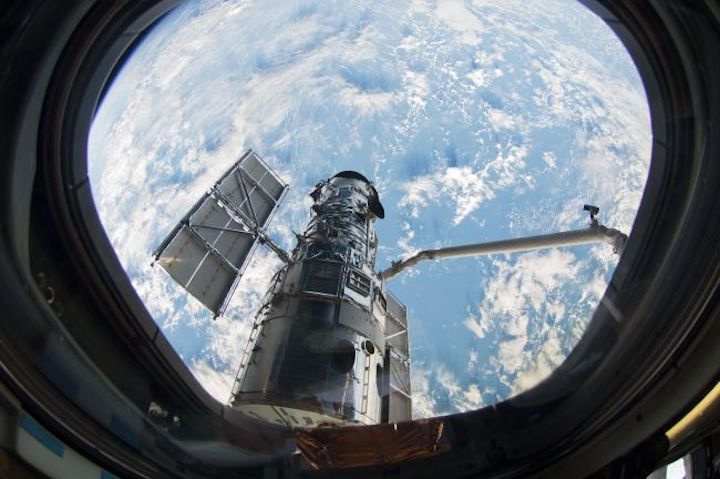If you're looking to inject a little space science into your pandemic-induced TV binge, Science Channel has a treat for you.
The network has produced a documentary to mark the 30th anniversary of the launch of NASA's famous Hubble Space Telescope, and it premieres tonight (April 19) at 8 p.m. ET/PT.
"Hubble: Thirty Years of Discovery" covers all aspects of the mission's remarkable story, "from its earliest conception in 1923, to its five iconic [servicing] missions spanning from 1993 to 2009," Science Channel representatives wrote in a statement. "It will also spotlight the groundbreaking insights that Hubble has revealed about the planet as well as the broader solar system and beyond."
Hubble took flight aboard NASA's space shuttle Discovery on April 24, 1990, and was deployed into Earth orbit a day later. Those early days were trying ones for the mission; the telescope's first images were blurry, an issue that team members traced to a flaw in Hubble's primary mirror.
Spacewalking astronauts fixed that problem in December 1993. And they kept coming back, repairing or upgrading Hubble on four additional space shuttle missions between 1997 and 2009. The spacewalkers installed some of Hubble's most powerful and important instruments, including the Advanced Camera for Surveys (in 2002) and the Wide Field Camera 3 (in 2009).
"Hubble: Thirty Years of Discovery" will give you a taste of what it was like to lay hands on the telescope in orbit. The documentary includes interviews with NASA astronauts Michael Massimino, Kathryn Thornton, Story Musgrave, Steven Smith and John Grunsfeld, all of whom flew on Hubble servicing missions.
And you'll learn about the many scientific breakthroughs that Hubble's work has enabled, and continues to enable. (It's still going strong today.) Perhaps the most famous of these came in the late 1990s, when astronomers studying Hubble observations of supernova explosions figured out that the universe's expansion rate is accelerating. This discovery led to the postulation of a mysterious repulsive force called dark energy, which apparently makes up about 70% of the universe (and earned three scientists the 2011 Nobel Prize in Physics to boot).
There'll also undoubtedly be lots of eye candy, the cosmic glamor shots that have become a Hubble trademark. And this aspect of the mission — its ability to engage people around the world with space science, and to share with them the beauty and wonder of the universe — is a big part of Hubble's legacy as well.
Massimino will probably be joining you, in spirit at least, if you settle in to watch "Hubble: Thirty Years of Discovery" tonight.
"I've seen pieces of it, and I'm really excited to see the whole thing," Massimino, who flew on two of the five Hubble servicing missions, told Space.com. "I think it's done very well, and at a very high level — the level [at which] Hubble's story deserves to be told."
Quelle: SC

